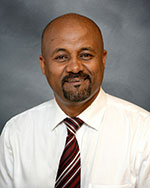Professor
Chemistry, Department of
Education and Certifications
Dr. Samuel Melaku Abegaz obtained his PhD degree in Analytical Chemistry in 2005 from
Ghent University, Ghent, Belgium. He continued carrying out scientific research as
a post-doctoral fellow at Howard University, Washington, DC. He joined Columbus State
University in 2008 as a tenure-track assistant professor. In 2012, Dr. Abegaz got
his tenure and was promoted to associate professor of chemistry. Dr. Abegaz is now
a full professor.
Biography
He is a recipient of several grants from Columbus State University and the Belgian
Technical Cooperation. Dr. Abegaz is among the few scientists participated in the
2007 Aerosol and Ocean Science Expedition (AEROSE) on the Atlantic Ocean conducted
by the National Oceanic and Atmospheric Administration (NOAA). He is a member of the
American Chemical Society, Phi Beta Delta, Honor Society for International Scholars,
and the Georgia Academy of Sciences. He was also a member of the Society for Applied
Spectroscopy, National Environmental Health Association and Chemical Society of Ethiopia.
He is actively involved in STEM initiated outreach programs in different high schools
to attract high school students to major in STEM disciplines. Dr. Abegaz has published
a number of peer reviewed journals on analytical, environmental, food chemistry, and
chemical education topics. He was a recipient of Governor Teaching Fellowship, GTF
(2010-2011), Doctoral Fellow of the Belgian Technical Cooperation (BTC), Belgium (2001-2005),
Fellow of the Flemish Interuniversity Council (Vlaamse Interuniversitaire Raad/VLIR),
Belgium (1998-2000).
Academic Areas
As an analytical and environmental chemist, Dr. Abegaz has a passion for the determination,
and speciation of trace elements using ICP - mass spectrometry (ICP-MS) and other
spectroscopic techniques. He has expertise in the areas of Analytical Chemistry, Environmental
Chemistry, Chemical Education, and Fermentation and Alcohol Technology. He has an
extensive experience in environmental sampling, sample preparation, development of
analytical methods such as GC- MS, GC, IR, ICPMS, and AAS; and analysis of toxic heavy
metals in atmospheric deposition (ambient air and wet deposition), fresh water, sediment,
soil, biological and food samples using spectroscopic techniques.

